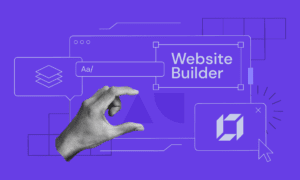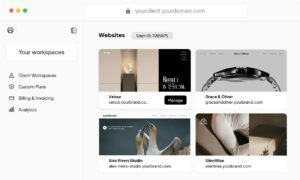Choosing the right website builder is a critical step for anyone looking to create a professional and functional online presence. With a plethora of options available, it’s essential to understand the key features that set the best builders apart. This article dives into the 10 must-have features to look for in website builders, ensuring that you select a platform that aligns with your needs and helps you build your digital masterpiece with ease.
Key Takeaways
- Ease of use is paramount; look for builders with intuitive interfaces like drag-and-drop or AI generators.
- Design flexibility allows for a unique site; seek builders that offer extensive customization options and templates.
- Consider the pricing structure and potential costs to ensure the builder fits your budget without compromising on features.
- E-commerce capabilities are essential for online stores; ensure the builder supports the sales features you need.
- The number of apps and integrations can extend your site’s functionality; choose builders with a robust app marketplace.
1. Ease of Use
When selecting a website builder, ease of use is paramount. The ideal platform should allow you to bring your vision to life without the need for deep technical expertise. A drag-and-drop interface is a key feature that simplifies the process, enabling you to position elements on your page with precision and ease.
- Look for clear navigation and simple menus to avoid any unnecessary complexity.
- Helpful documentation and responsive customer support can greatly enhance the user experience.
- An easy-to-use editor is essential for making quick updates or changes without the need for a developer.
The goal is to ensure that the website creation process is as streamlined and stress-free as possible.
Ease of use should not come at the expense of functionality. The best website builders balance user-friendliness with powerful features, allowing both novices and experienced users to create professional-looking websites efficiently. Remember, a website builder that saves you time also saves you money.
2. Design Flexibility
When selecting a website builder, design flexibility is paramount. It’s the cornerstone of creating a unique online presence that stands out from the competition. A builder with extensive customization options allows you to tailor your site to your brand’s identity and customer experience.
- Look for a wide range of templates and flexible layouts.
- Ensure there are ample options to adjust colors, fonts, and other design elements.
- Consider the ease of use of the customization interface.
The true test of a website builder’s design flexibility lies in its ability to let you transform a template into a website that feels entirely your own.
Remember, while some builders may boast a vast array of customization tools, the most critical factor is how these tools align with your specific design needs and skill level. Choose a platform that balances flexibility with simplicity, ensuring you can effectively bring your vision to life.
3. Pricing
When selecting a good website builder, pricing is a critical factor that can significantly impact your budget. It’s important to balance cost with the features and capabilities you require for your online presence. Some platforms offer free plans suitable for basic sites, while others provide more advanced services at a higher cost.
For example, a standard plan for an e-commerce-focused website builder might start at $29/month, offering the ability to connect multiple storefronts and integrate with various marketplaces. On the other hand, more budget-friendly options are available, with plans starting as low as $13.95/month, including essential e-commerce features and analytics.
Ensure the website builder you choose offers scalable plans that can grow with your business, accommodating increased traffic and sales without requiring a complete platform switch.
Here’s a quick comparison of two hypothetical website builders:
| Builder | Starting Price | E-commerce Features | Scalability |
| Builder A | $29/month | Advanced | High |
| Builder B | $13.95/month | Basic | Moderate |
Remember, the right website builder for you should offer a balance between cost, features, and the potential for growth.
4. E-commerce Capabilities
In the digital age, e-commerce capabilities are a cornerstone for any business looking to sell online. A website builder with robust e-commerce features can be the difference between a thriving online store and a stagnant digital presence.
Essential e-commerce tools include inventory management, shipping configuration, tax tools, and multiple payment gateways. Seamless integrations with marketing tools are also crucial for driving sales and managing promotions.
Here’s a quick checklist of e-commerce features to consider:
- Inventory management system
- Variety of shipping and tax configuration options
- Multiple payment gateways support
- Marketing and SEO tools
- Order management and shopping cart functionality
Remember, not all website builders are created equal when it comes to e-commerce. Some offer basic functionalities suitable for small ventures, while others provide scalable solutions that grow with your business. Choose a platform that aligns with your current needs but also has the capacity to handle your future growth.
5. Number of Templates
The number of templates a website builder offers can significantly impact your site’s uniqueness and the speed at which you can launch. A vast library of templates ensures that you can find a design that resonates with your brand without looking identical to others in your niche.
- Wix, for instance, stands out with over 900 professionally designed templates.
- SITE123 offers a more modest selection with over 180 templates, focusing on simplicity and automatic features.
Choosing the right template is the first step towards creating a website that captures the essence of your business and appeals to your target audience.
Remember, while a large number of templates is advantageous, the quality and customization options they offer are equally important to consider.
6. Number of Apps and Integrations
The breadth of apps and integrations a website builder offers can significantly enhance the functionality and versatility of your website. A robust selection allows for greater customization and the ability to connect with a wide array of third-party services.
- Wix: Offers over 300 apps and integrations, enabling a high degree of customization.
- Site123: Provides a moderate selection with over 80 apps and integrations.
- Squarespace: Features around 30 apps and integrations, focusing on quality over quantity.
- Webador: Has a limited range with 50+ apps, but offers a quick build time.
- IONOS Site Builder: Offers a basic selection with 20+ apps, prioritizing ease of use.
When selecting a website builder, consider not just the number of apps and integrations available, but also the relevance to your business needs. A platform with fewer, high-quality integrations may serve you better than one with a multitude of lesser-used options.
Remember, the goal is to find a website builder that can grow with your business, offering the tools and services you need to expand and evolve. The right set of apps and integrations can make all the difference in creating a dynamic, user-friendly site that stands out in the digital landscape.
7. Free Plan Availability
When considering a website builder, the availability of a free plan can be a crucial factor for many users. Free plans allow you to test the platform’s features and usability without any financial commitment. However, it’s important to note that free plans often come with limitations such as the number of products you can list, availability of certain features, or the presence of the platform’s branding on your site.
While some platforms may not offer a free plan, they might provide a free trial period or a very low-cost entry plan, which can still be a good opportunity to explore the builder’s capabilities.
Here’s a quick comparison of free plan offerings from various website builders:
- Squarespace: No free plan, but offers a 14-day free trial.
- Shift4Shop: Free if you sell over $500/month (US only), otherwise $29/month.
- Ecwid: Free plan available, limited to up to five products.
- Shopify: No free plan, starting at $19/month.
Remember, while a free plan can be a great starting point, it’s essential to consider the long-term suitability of the website builder for your needs, especially if you plan to scale your business.
8. Time to Build
The time to build a website is a critical factor for many users, especially those who need to get online quickly. A website builder’s efficiency can be measured by how long it takes to create a functional test site. Below is a comparison of popular website builders and their time to build a test site:
| Website Builder | Time to Build Test Site |
| Wix | 90 minutes |
| Site123 | 60 minutes |
| Squarespace | 50 minutes |
| Webador | 10 minutes |
| IONOS | 30 minutes |
The ease of use and the number of steps required to publish a site can greatly influence the time to build. Builders with drag-and-drop interfaces and pre-designed templates tend to allow for quicker site creation.
It’s important to consider not just the speed, but also the quality of the final product. A fast build time should not compromise the website’s design, functionality, or scalability. Therefore, when evaluating website builders, balance the time to build with the platform’s overall capabilities to ensure it meets your long-term needs.
9. Customization Options
The ability to tailor your website to your brand’s unique identity is a pivotal feature of any website builder. Customization options can significantly impact your site’s appeal and user experience, ensuring that your online presence is not just another cookie-cutter site but a reflection of your business’s personality and values.
- Look for builders that offer a wide range of templates and flexible layouts.
- Ensure there are ample options to adjust colors, fonts, and other design elements.
- Consider the ease with which you can add custom code or integrate third-party services.
The right customization features empower you to create a distinctive and engaging customer experience, setting you apart from the competition.
Remember, while some platforms may boast extensive customization capabilities, they should not compromise on ease of use. A balance between sophisticated customization and user-friendly design is key for a successful website build.
10. Scalability
When selecting a website builder, scalability is a critical feature to consider. It’s not just about the ability to handle more traffic or products; it’s about growing with your business without the need to switch platforms. Look for website builders that offer tiered plans, which allow you to start small and upgrade features and capacities as your business expands.
- Tiered pricing plans to match business growth
- Capability to handle increased traffic and sales volume
- Flexibility to add more products or services
Ensure the platform you choose can scale seamlessly with your business needs, avoiding any disruptions or the necessity for major overhauls.
Scalability also means having access to advanced tools and resources as your needs become more sophisticated. This includes marketing, analytics, and customization options that can evolve with your business. A scalable website builder is an investment in your business’s future, ensuring that as your online presence grows, your platform remains robust and supportive.
Conclusion
In the quest to establish a compelling online presence, selecting the right website builder is paramount. Throughout this article, we’ve explored the essential features that distinguish the best platforms in the market. From ease of use to design flexibility, pricing, e-commerce capabilities, the variety of templates, and the range of apps and integrations, these factors are critical in shaping your website’s success. While the top website builders like Wix have set a high standard with their comprehensive offerings, remember that the ideal choice ultimately hinges on your specific needs and goals. Whether you’re a novice or an experienced webmaster, prioritize these key features to ensure that your website builder aligns with your vision and scales with your growth.
Frequently Asked Questions
What are the six criteria to consider when choosing a website builder?
The six criteria to consider are ease of use, design flexibility, pricing, e-commerce capabilities, number of templates, and the number of apps and integrations available.
How were the website builders tested and ranked?
Website builders were tested based on criteria including pricing, ease of use, and the number of website templates available. Each builder was scored and ranked accordingly.
Can you compare the top website builders at a glance?
Yes, website builders can be compared based on ease of use, design flexibility, pricing, number of templates, number of apps and integrations, free plan availability, and the time taken to build a test site.
What are the important lessons learned from testing website builders?
Website building is highly personal, free plans have limitations, and it’s important to choose a builder that suits your specific needs, such as ease of use, customization, and pricing.
What should you look for in a dropshipping website builder?
For a dropshipping website builder, you should prioritize ease of use, customization options, pricing, and scalability to ensure efficiency and a unique customer experience.
Why is the number of apps and integrations important in a website builder?
The number of apps and integrations a website builder offers is important for customizing your site’s functionality and ensuring that you can integrate existing software to enhance your website.












































